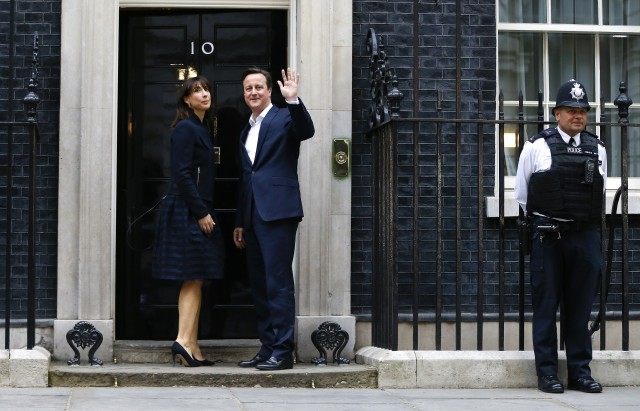Following the UK General Election from the American side of the Atlantic whilst simultaneously keeping tabs on the nascent race for the Republican Presidential nomination couldn’t have offered a starker contrast.
America’s conservatives, from across the opinion spectrum, will soon line up in a gruelling, months-long battle to determine the identity of the man or woman who will take on Hillary Clinton (unless her scandals force the end of her campaign before then).
True, money will play an inevitable role in how the contest plays out. But, over the course of the debates, the town hall meetings, the rallies, media interviews and hundreds of campaign ads, there will be a genuine battle of ideas within the conservative movement.
Libertarians will spar with establishment, big-business Republicans; Isolationists will try and navigate a gauntlet of opprobrium from traditional security hawks and reconstructed neo-cons; Tea Party standard bearers will try and trash the reputation of RINOs, and so on. It will be about ideas and ideals, gloves off; great fun; and the Republican establishment will have limited control over much of what is said and done in the name of the Party.
And that it is exactly how genuine debate should be within a healthy democracy.
Now, look across the pond to the UK and, very worryingly, you will see that we don’t seem to do things that way anymore – at least not in the Conservative Party.
I am as happy as the next conservative that the Party confounded all predictions and achieved the majority that has returned David Cameron for the next 5 years. Business and the stock market understandably breathed a huge sigh of relief.
But it is also clear that something sinister and fundamentally un-conservative has infected the way the Party conducts itself. More than ever before, it is consumed with a nasty, controlling and centralized culture that demands unquestioning conformity. And woe betide those with the temerity not to genuflect in fealty.
The recent attacks on the Bow Group and its chairman Ben Harris-Quinney and the commentator Tim Montgomerie offer an unpleasant example of a much wider malaise. The two men are not cut from the same ideological cloth, but both offer an approach to conservatism that at times differs from the current Conservative Party house view. This appears to make them fair game for ad hominem attack.
When I joined the Conservative Party nearly 25 years ago, and, indeed, when I first got involved in the Bow Group – the attraction of both was that they were a genuinely “Broad Church” – a forum for a competition of different conservative ideas; a place where numerous powerful personalities with diverse viewpoints could all feel at home.
As a former Chairman I know better than most that the Bow Group in particular has never been an institution tied to one particular point of view, nor is it obliged to offer unquestioning loyalty to the leadership of the Conservative Party. Indeed, its declared remit is to “hold the Conservative Party to the account of the conservative movement”.
In 1973 the then Bow Group Chairman Peter Lilley did not hesitate to challenge the Tory government of Ted Heath, producing an alternative manifesto and vision that played a leading role in the development of Thatcherism.
Now, Harris-Quinney is certainly not a conformist. He speaks his mind. And when he does, not every one of his fellow Conservatives will agree.
But what he has unquestionably achieved over the last few years is to move the Bow Group forward from an organisation that had a diminished role in our national political debate, to one at the heart of it.
People might agree or disagree with the ideas put forward in that debate, but everyone should be concerned at the desire from any quarter to silence it.
Sadly, that is what appears to have happened to Harris-Quinney during the election campaign, culminating in one of the most bizarre TV interviews many of us have ever seen – his brush with Andrew Neil on the politics show.
Being in the US at the time, I didn’t see the interview live but was alerted to it by an old friend who happens to be a Labour supporter who described it as “incomprehensible”. My friend said, “..it looked like the Politics Show has seven or eight minutes to fill and decided to do so by going over Ben Harris-Quinney’s CV, and making baseless accusations.”
Of course, what my friend didn’t know, was that behind the scenes the “inside baseball” interrogation of Harris-Quinney, had most likely been set up by an unholy alliance of media and political insiders determined to trash his reputation, rather than debate ideas. (By the way, the disdain Neil showed toward 99.9% of his viewers makes another excellent argument to remove the BBC’s license fee and force it to the rigours of the free market).
If this conduct is driven with intent by those within the Conservative Party then it is simply wrong and unbecoming of a great Party.
Conservatism does not belong to any one person, organisation or political party. It is an ideological and philosophical movement. It will always manifest across a broad range of platforms – it is an idea, an ideal which is indestructible and immutable.
The debate around conservative values will continue both within and outside of the Conservative Party – it may happen in UKIP, here on the pages of Breitbart, in homes, workplaces, and pubs and clubs up and down the country. It will involve those that carry a Conservative Party membership card – and many that certainly don’t.
We will not all agree with everything that people will say in that debate. But for the sake of our democracy and our freedoms, we must defend to the death their right to say it.
Brian Cattell is a former Chairman of the Bow Group


COMMENTS
Please let us know if you're having issues with commenting.